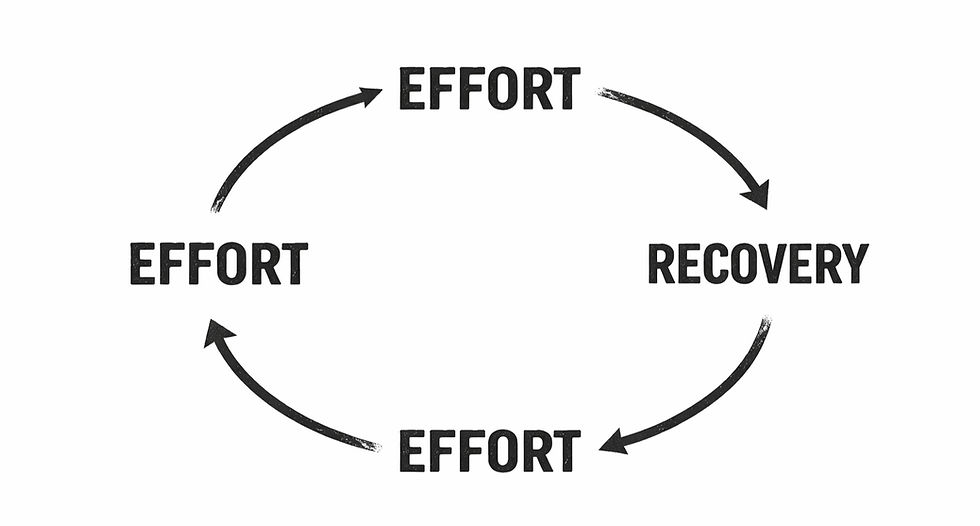How to Beat Procrastination with Science
- Lauren Lee
- Aug 12, 2025
- 4 min read
Have you ever found yourself scrolling on your phone while being fully aware that you shouldn't be? That there are much more important, urgent matters on your to-do list that need accomplishing? And even after realizing this, you still continue swiping away at your screen, fighting the stress that keeps building inside you as the hours fly by.
This is called procrastination, or the act of delaying and putting off tasks that need to be done. I am personally very guilty of this, as are countless others. Children and adults alike all find themselves falling victim to the addicting yet consequential pattern of procrastination.
On the surface, some may assume that laziness is the problem. However, in an article published by Georgetown University, it was suggested that behavioral and social sciences provide strong evidence of behavior's significant ties to emotional regulation. According to Georgetown's School of Nursing & Health Studies, daunting tasks can induce negative emotions that cause the individual to seek temporary stress relief and mood regulation by avoiding the task. Mainly, feelings such as self-doubt, stress, fear, and disinterest can engender individuals to procrastinate.
As a high school student, sometimes it feels as though I am drowning under the weight of everything I need to accomplish, whether it be homework, assignments, projects, or studying for upcoming tests. When they begin to accumulate into an overwhelming list of to-do's, it is easy to want to procrastinate and reassure myself that "I have time. I'll do it later."
Connection: Procrastination & Parkinson's Law
"Have you ever put off a project until the last minute even though you knew it would only take a few hours to complete? That’s procrastination at its finest, but it’s also Parkinson’s Law in action. When you have time, you take it. You either use the time to complete the task more slowly or you procrastinate and complete the task right before the due date" (Asana, 2025).
Parkinson's Law can be defined as "the idea that work expands to fill the time allotted for its completion" (Asana, 2025). Essentially, the implications of this scientific finding provides an explanation as to why people find themselves taking longer to complete a task, or ending up procrastinating, until right before the due date. What this law means is that the more time individuals have to accomplish a given task-whether it be an assignment, errand, chore, or project-and the further away the deadline is, the longer it takes to actually finish.

Ever wonder why you always begin studying for an important test the night before? The test that you had previously known about for weeks?
Studies discovered that people tend to focus on how much time is available to complete a task rather than how much time is needed, which is why the cycle of wasting time and working inefficiently perseveres.
Overcoming Procrastination
The question is, how can we break this widespread cycle of procrastination, and instead, conquer our tasks in an efficient, timely, and productive manner? Here are 4 powerful strategies to overcome procrastination:
Set strict personal deadlines. If an assignment is due on Friday, complete it on Wednesday. If you have an major test coming up, study a week prior rather of the night before. Establishing earlier target dates will significantly reduce stress and prevent you from delaying your start on a task.
Break big tasks into smaller ones. Oftentimes, important tasks can feel daunting and overwhelming to the point of avoiding their completion until last minute. However, breaking down a project into smaller tasks can make it more approachable and less intimidating.
Practice the 5-minute Rule. The hardest part about completing a task is starting it. So, when you find yourself procrastinating, try the 5-minute rule. Tell yourself that you're going to work on your task for just 5 minutes. 5 minutes doesn't seem like much, right? Once the 5 minutes pass, you'll find yourself working at a steady pace. You're concentrated on your task, both mentally focused and emotionally motivated. And those 5 minutes? You may find yourself finishing your task before you even realized those 5 minutes were long over.
Remember your WHY. When people turn to procrastination, they are chasing instant gratification through short-term gains. Instead of avoiding your task and picking up your phone, pause what you're doing, re-center your thoughts, and remind yourself why you're doing what you're doing. Focus on achieving your long-term goals. Set down your phone and work on your task. Every step you take is a step closer to your dreams.
Sources
"How to Stop Procrastinating: There Is a Science to It." Nursing@Georgetown, the online MSN program from the School of Nursing & Health Studies, Georgetown University, 2 Nov. 2021, https://online.nursing.georgetown.edu/blog/how-to-stop-procrastinating-there-is-a-science-to-it/. Accessed 8 Aug. 2025.
"Parkinson's Law: How to Overcome It to Increase Productivity." Asana AI, Asana, https://asana.com/resources/parkinsons-law. Accessed 8 Aug. 2025.





Comments